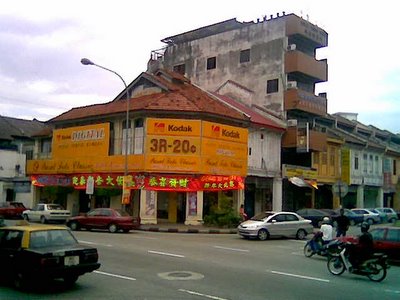My STS 101 in social psychology, politics
 During my walk-about in Ipoh's New Town during the Third Day of the Chinese New Year, I certainly could not allow myself to miss the opportunity to visit my old house and coffesshop at No. 24, Clare Street. The shop, located at the center of the most vibrant part of the town for many years until the collapse of the tin-mining industry in the Kinta Valley in mid-1980s, was sold in 1986 because none of my parents' children were going to continue the business after we had more modern endeavours to pursue as the results of higher education.
During my walk-about in Ipoh's New Town during the Third Day of the Chinese New Year, I certainly could not allow myself to miss the opportunity to visit my old house and coffesshop at No. 24, Clare Street. The shop, located at the center of the most vibrant part of the town for many years until the collapse of the tin-mining industry in the Kinta Valley in mid-1980s, was sold in 1986 because none of my parents' children were going to continue the business after we had more modern endeavours to pursue as the results of higher education.It is now a photo studio, although the essential structure of the building remains unchanged.
It was in that shop that I lived, studied, worked, played, debated, fought street 'battles' with bullies and socialised in a multiethnic society from 1962 to 1981. There, I learned many things in life not only from school textbooks but also real-life moral-reasoning stories from my grandmother who was an active leader of women organisations in town (only after her departure in late 1970s that some elderly neighbours recalled that she was associated with the leftwing faction of the banned Kuomintang Revolutionary Committee in Ipoh in 1930s), and my parents as well as some of their customers-cum-buddies like Mr. Chan, Mr. Loh and Encik Shafie.
We remember Encik Shafie very well until today because it was that Telecom clerk from Gunung Rapat who, in the mid-70s, encouraged my father to ignore conservative opinion in a segment of the nrighbourhood not to 'waste money' to send my eldest sister to university because she is a female. That conservative or even reactionary school of thought opined that females' role is only to get married to rich men and give birth to as many children as possible so as to bring 'honour' and 'wealth' to her parents' families.
Thanks to Encik Shafie's moral support and timely advice, my father finally firmed up his mind to allow her to enrol into the Science Faculty of the then newly-found Universiti Sains Malaysia (USM) in Penang. Encik Shafie's own daughter, who also spoke Cantonese, went to Universiti Malaya to study dentistry.
Mr. Loh was a de-commissioned (and utterly disillusioned) soldier of Chinese Republican army in the 1946-1949 Chinese Civil War. Just before the utterly corrupt rightwing Kuomintang regime was defeated in the Mainland and forced to take refuge in Taiwan under American protection, Mr. Loh left for greener pasture in Malaya and became a decent small businessman in Ipoh. He was very well-versed in Chinese classical literature. It was him who first interested me to read books like the Romance of Three Kingdoms (simplified and abridged edition for children, of course) and helped explained to me who were the good or bad guys in different contexts.
Like Encik Shafie, Mr. Loh was a passionate advocate and supporter of women's liberation through modern and secular education. Both of them have long departed.
Mr. Chan, who is still alive (and enjoying his horse-racing bets), was an officer in the Education Department. It was he who helped to transfer my primary school enrollment from the English-medum Anderson to Chinese-medium Sam Tet at the eleventh hour after my father changed his assessment on the future of this part of the world as the result of the 1967 British announcement of its plan to withdraw militarily 'East of Suez' . Like Encik Shafie and Mr. Loh, Mr. Chan also gave many sound advices to my parents on how to make sure that their children got the best out of the modern system of education.
Of course, there were also customers who were swindlers, crooks, bullies, charlatans, pimps and rogues. As long as they kept the peace in our shop and paid for their food and drink, we just treated them as customers. However, sometimes, we had to intervene if and when they preyed on poor women, children as well as physically or mentally disabled persons in front of us.
Above all, it was in that shop and house that I first learnt many real-life paradoxes, contradictions, ironies, nuances, fine balances and gray-area scenarios or situations throught personal experiences and encounters with the bad, the good and the ugly. It has taught me that one can actually be principled without being doctrinaire, and practical and flexible without being opportunistic.


0 Comments:
<< Home